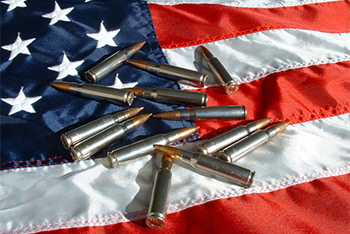 Aug. 24, 2015 – Non-U.S. citizens who are not authorized to be in the U.S. but have substantial connections with the country are protected by the Second Amendment to the U.S. Constitution, which grants the right to bear arms, a federal appeals court has ruled.
Aug. 24, 2015 – Non-U.S. citizens who are not authorized to be in the U.S. but have substantial connections with the country are protected by the Second Amendment to the U.S. Constitution, which grants the right to bear arms, a federal appeals court has ruled.
But in U.S. v. Meza-Rodriguez, No. 14-3271 (Aug. 20, 2015), a three-judge panel for the U.S. Court of Appeals for the Seventh Circuit also upheld a federal law that prohibits unauthorized, non-U.S. citizens from possessing firearms or ammunition.
Mariano Meza-Rodriguez is a citizen of Mexico, but was brought to the U.S. as a child and has remained in the U.S. for approximately 20 years. In 2013, Milwaukee police officers arrested Meza-Rodriguez. They found a .22 caliber cartridge in his pocket.
Police were responding to a bar fight and chased Meza-Rodriguez, who had been previously identified as the man brandishing a firearm in a different local tavern.
The federal government indicted Meza-Rodriguez under 18 U.S.C. section 922(g)(5), which makes it unlawful for a person who is “illegally or unlawfully in the United States” to possess a firearm or ammunition. Meza-Rodriguez moved to dismiss.
He said section 922(g)(5) places an unconstitutional restraint on his Second Amendment rights. That is, Meza-Rodriguez said the law categorically excludes a group of people from constitutional protection without a constitutionally sufficient reason.
The U.S. District Court for the Eastern District of Wisconsin ruled that the Second Amendment does not protect non-U.S. citizens with “unauthorized status,” so the government does not need a constitutionally sufficient reason to exclude them.
Ultimately, Meza-Rodriguez pleaded guilty, and he was later deported to Mexico. Because the conviction is an aggravated felony, federal law permanently bars him from returning to the U.S., even if legal steps are taken to obtain authorized status.
Unauthorized, non-U.S. Citizens are Protected
The appeals court panel noted that “the people” have an individual right to carry and possess weapons under the Second Amendment to the U.S. Constitution.
But the panel also explained that while other circuits have weighed in, no U.S. Supreme Court decision has addressed “whether unauthorized noncitizens (or noncitizens at all) are among ‘the people’ on whom the Amendment bestows this individual right.”
The federal appeals courts for the Fourth, Fifth, and Eight Circuits have ruled that unauthorized noncitizens are not protected. But the Seventh Circuit did not agree, creating a circuit split and an increased likelihood of U.S. Supreme Court review.
A 2-1 majority in Meza-Rodriguez held that the Second Amendment protects unauthorized noncitizens when they come into the U.S. and develop substantial connections with the country, the standard to determine whether an unauthorized noncitizen is entitled to invoke protections afforded by the Fourth Amendment.
“Plyler shows that even unauthorized aliens enjoy certain constitutional rights, and so unauthorized status (reflected in the lack of documentation) cannot support a per se exclusion from ‘the people’ protected by the Bill of Rights,” wrote Judge Diane Wood, joined by Judge Frank Easterbrook to form the 2-1 majority.
The majority explained that Meza-Rodriguez developed substantial connections with the U.S. the last 20 years. “[H]is behavior left much to be desired, but as we have said, that does not mean that he lacks substantial connections with this country,” Wood wrote.
“[W]e see no principled way to carve out the Second Amendment and say that the unauthorized (or maybe all noncitizens) are excluded. No language in the Amendment supports such a conclusion, nor, as we have said, does a broader consideration of the Bill of Rights,” wrote Wood, noting that this holding creates a circuit split.
The Law is a Permissible Restriction
Although the 2-1 majority held that Meza-Rodriguez is protected by the Second Amendment, the panel also ruled that Congress can place permissible restrictions on a constitutional right, and it did so with a restriction against unauthorized noncitizens.
“Congress’s interest in prohibiting persons who are difficult to track and who have an interest in eluding law enforcement is strong enough to support the conclusion that 18 U.S.C. § 922(g)(5) does not impermissibly restrict Meza-Rodriguez’s Second Amendment right to bear arms,” Judge Wood wrote, allowing the case to be dismissed.
However, the majority rejected the government’s claim that section 922(g)(5) reflects a likelihood that unauthorized noncitizens are more likely to commit crimes since they have shown a willingness to defy laws by entering the U.S. illegally:
“While it is a misdemeanor to enter the country improperly … many unauthorized immigrants – such as Meza-Rodriguez himself – were too young to form the requisite intent to violate this statute when they were originally brought to the United States.”
Judge Flaum Concurs
Judge Joel Flaum did not join the majority’s conclusion that the Second Amendment protects unauthorized noncitizens and indicated his doubts that constitutional protection applies. But he concluded that the case did not require an answer to that question.
“[T]he question of who possesses the right need not be answered to reach our outcome here, because regardless of the answer 18 U.S.C. § 922(g)(5) satisfied intermediate scrutiny and thus passes constitutional muster,” Judge Flaum wrote.
